In the fast-paced world of healthcare, few names resonate as strongly as Dr. Dick McDonnell. A trailblazer in medical innovation, Dr. McDonnell has not only revolutionized medical technology but also reshaped the way future doctors are trained. This post explores his remarkable contributions, their impact on medical education, and how they continue to influence the future of healthcare.
Who is Dr. Dick McDonnell? A Legacy of Excellence
Dr. Dick McDonnell’s name is synonymous with groundbreaking advancements in medicine. With an illustrious career that spans decades, he has dedicated his life to pushing the boundaries of medical science. His work bridges the gap between traditional practices and modern technology, leading to improved patient outcomes and enhanced healthcare delivery.
His contributions are not just limited to research and development. Dr. McDonnell has actively engaged in medical education, ensuring that his findings and techniques are incorporated into the training of upcoming medical professionals. His commitment to mentoring young doctors has left an indelible mark on the medical community, inspiring a new generation of healthcare leaders.
Dr. McDonnell’s influence extends beyond the hospital and classroom. Through numerous publications, lectures, and seminars, he has shared his knowledge with the world, fostering a collaborative environment where ideas can flourish. This exchange of information has been instrumental in advancing global healthcare standards.
The Evolution of Healthcare Innovations Under Dr. McDonnell
The medical field has witnessed significant transformations under Dr. McDonnell’s guidance. His innovative approaches to treatment and diagnosis have set new benchmarks in the industry. By integrating cutting-edge technology with traditional practices, he has created a hybrid model that maximizes efficiency and effectiveness.
One of his notable contributions is the development of advanced imaging techniques. These technologies have revolutionized the way diseases are diagnosed, allowing for earlier detection and more precise treatment plans. The ripple effect of these innovations is felt across various medical disciplines, improving outcomes for countless patients.
Dr. McDonnell has also played a pivotal role in the advancement of telemedicine. By advocating for the use of digital platforms in healthcare, he has made it possible for patients in remote areas to access quality medical care. This initiative has not only expanded healthcare access but also reduced the burden on overwhelmed medical facilities.
Impact on Medical Education and Training
Dr. McDonnell’s influence is profoundly evident in the realm of medical education. Recognizing the need for a modernized curriculum, he has been instrumental in incorporating his research findings into academic programs. This approach ensures that future doctors are well-versed in the latest medical technologies and practices.
His emphasis on practical, hands-on training has reshaped the learning landscape for medical students. By encouraging the use of simulation-based education, Dr. McDonnell has provided students with a safe environment to hone their skills before entering the clinical setting. This experiential learning approach has been crucial in producing competent and confident healthcare professionals.
Furthermore, Dr. McDonnell has advocated for interdisciplinary collaboration in medical training. By fostering partnerships between different specialties and healthcare sectors, he has promoted a more holistic approach to patient care. This integrated perspective is vital in addressing complex health challenges and improving overall healthcare delivery.
Case Studies and Success Stories

Dr. McDonnell’s innovations are not just theoretical concepts—they have been successfully implemented in real-world scenarios. Numerous case studies highlight the positive impact his work has had on patient care and outcomes.
One such example is the use of his advanced imaging techniques in oncology. These methods have drastically improved cancer detection rates, allowing for earlier intervention and increased survival chances. Patients who previously faced limited options now have access to cutting-edge treatments, thanks to Dr. McDonnell’s contributions.
Another success story is the implementation of telemedicine in rural communities. By leveraging digital platforms, healthcare providers can offer consultations and follow-ups remotely, significantly reducing travel time and costs for patients. This initiative has been particularly beneficial during the COVID-19 pandemic, ensuring continuity of care while minimizing exposure risks.
Dr. McDonnell’s work has also inspired numerous healthcare institutions to adopt his methodologies. Hospitals and clinics around the world have reported improved operational efficiency and patient satisfaction after integrating his techniques. These success stories serve as a testament to the tangible benefits of his innovations.
The Future of Healthcare with Dr. McDonnell’s Vision
Looking ahead, Dr. McDonnell continues to be at the forefront of emerging trends and developments in healthcare. His insights into the future of medicine are invaluable for professionals and institutions seeking to adapt to an evolving landscape.
One area of focus is personalized medicine. Dr. McDonnell advocates for tailored treatment plans based on individual patient profiles, leveraging genetic and environmental data to optimize outcomes. This approach promises to revolutionize healthcare by providing more accurate and effective interventions.
Another key development is the integration of artificial intelligence (AI) in medical practice. Dr. McDonnell’s research explores how AI can enhance diagnostic accuracy and streamline administrative tasks, freeing up valuable time for healthcare providers to focus on patient care. These advancements have the potential to reshape the entire healthcare ecosystem.
Dr. McDonnell also foresees a greater emphasis on preventive care. By promoting lifestyle changes and early interventions, he aims to reduce the incidence of chronic diseases and improve population health. This proactive approach aligns with global efforts to create sustainable healthcare systems that prioritize prevention over treatment.
Conclusion
Dr. Dick McDonnell’s contributions to the medical field are nothing short of transformational. His innovative approaches to healthcare have set new standards and inspired countless professionals worldwide. From advancing medical education to improving patient care, his work continues to shape the future of medicine.
For those interested in learning more about Dr. McDonnell’s groundbreaking work, we encourage you to engage with the resources and insights shared in this blog post. Whether you’re a medical professional, healthcare innovator, or student, there are valuable lessons to be learned from his contributions.

